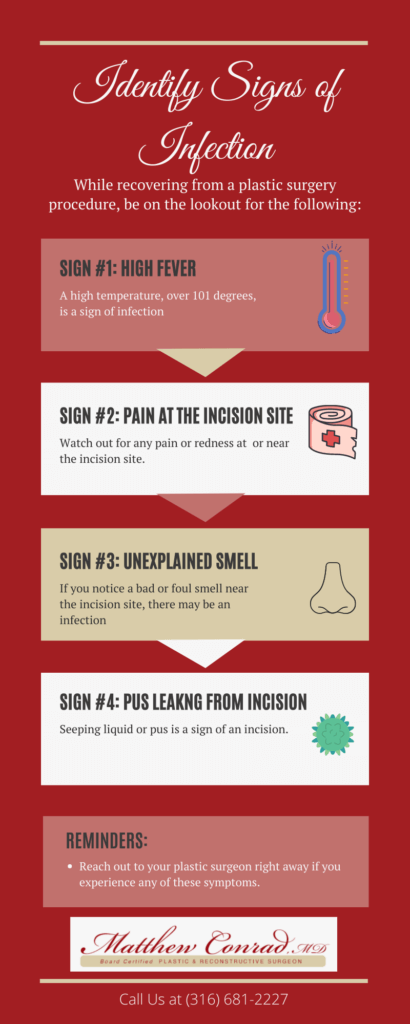April 01, 2022 | 5 minute read
4 Minute Read:
Let’s face it, plastic surgery can be a bit scary. While we may be excited for the stunning results that will finally give us the look and feel we desire, along with improved confidence and comfort in our bodies, the idea of anesthesia, incisions, and complications from the surgery can make us feel nervous.

One of the scariest complications with cosmetic surgery is infection after your procedure. Though rare, with 0.79 percent of plastic surgery patients having infection after their surgery, infection is still the most common complication associated with cosmetic surgery procedures. And it goes without saying that preventing infection is really important.
Not only can infection cause health risks, but it can also negatively affect your aesthetic results. However, the good news is that there are ways to prevent the risk of infection.
Additionally, there are signs to be on the lookout for to make sure that you catch any infection before it becomes a real issue.
What Plastic Surgery Procedures Have an Increased Risk of Post-op Infection?
Any invasive surgery procedure comes with the risk of infection. It makes sense, since you are exposing the inside of your body to the outside world.
Since your plastic surgeon will make sure that your procedure is completed in a sterile and safe environment, many infections occur outside of the operating room.
While minimally invasive procedures, such as injectables, can cause infection, breast and body contouring surgery, such as tummy tuck surgery (abdominoplasty), breast augmentation surgery, breast lift surgery (mastopexy), liposuction surgery, and Mommy Makeover surgery, all have higher risks of infection.
But even with these high risks, there are plenty of ways to reduce your chances of infection.
What Can I Do to Reduce My Chances of Infection?
While there is no fool-proof way of preventing infection after your plastic surgery procedure, there are many precautions you can take, such as:
 Following All of Your Post-op Instructions
Following All of Your Post-op Instructions
After your plastic surgery procedure, your plastic surgeon will give you a list of do’s and don’ts for your recovery. It is important to follow these instructions to the letter. This includes going to your follow-up appointments, bathing and showering correctly (so that your incisions are not directly upset by the water), and taking any prescribed antibiotics.
Also, you will want to make sure to rest your body while it recovers; don’t push yourself to do too much, though short walks can be helpful for speeding up your recovery process.
Keeping Your Incisions Clean and Dry
Your incisions heal quicker when they are kept dry, and you want to make sure that your incisions heal as quickly and safely as possible. Keeping your incisions clean will also prevent any bacterial or viral infections from forming inside the closing wound. Additionally, it is important that you do not use any ointments, lotions, creams, peroxide, or alcohol on your healing incisions.
You want to let your body heal itself as naturally as possible, without any outside interference.
Changing Your Bandages and Dressings Regularly
It is important that you consistently change your bandages and dressings to prevent any moisture from affecting the healing wound, which can slow down the healing process and increase the chance of infection. The purpose of these bandages and dressings is to sop up any blood after the procedure as well as keep the incision clean and safe from any outside elements that may cause infections to set in.
Putting Only Good in Your Body
You’ve heard about the importance of drinking water for the health of your body, and after your plastic surgery, this is even truer. Drinking plenty of water helps speed up the recovery process and keep infections from settling into your surgery area.
You also want to make sure to eat healthy foods that will boost your immune system and keep you physically healthy and energized.
Additionally, it is important that you stop smoking after your plastic surgery procedure, and make sure not to drink any alcohol, as alcohol thins your blood and can slow down your body’s healing process.
What Should I Look for After My Plastic Surgery?
Knowing what to do after your plastic surgery to help reduce the risk of infection is important. But equally important is knowing the signs of infection.
If you experience any of these symptoms, it is important to contact your plastic surgeon as soon as you can:
- Body temperature higher than 101.5°F
- Continuous or increased pain in the incision site
- Continued redness or warmth at the incision site
- Bad or foul smell coming from the incision site
- Any pus or clear liquid discharge from the incision site
Interested in Finding Out More About Plastic Surgery?
If you want to learn more about plastic surgery, including how to prevent infection after your procedure, give us a call at (316) 681-2227 or fill out our online form here.

